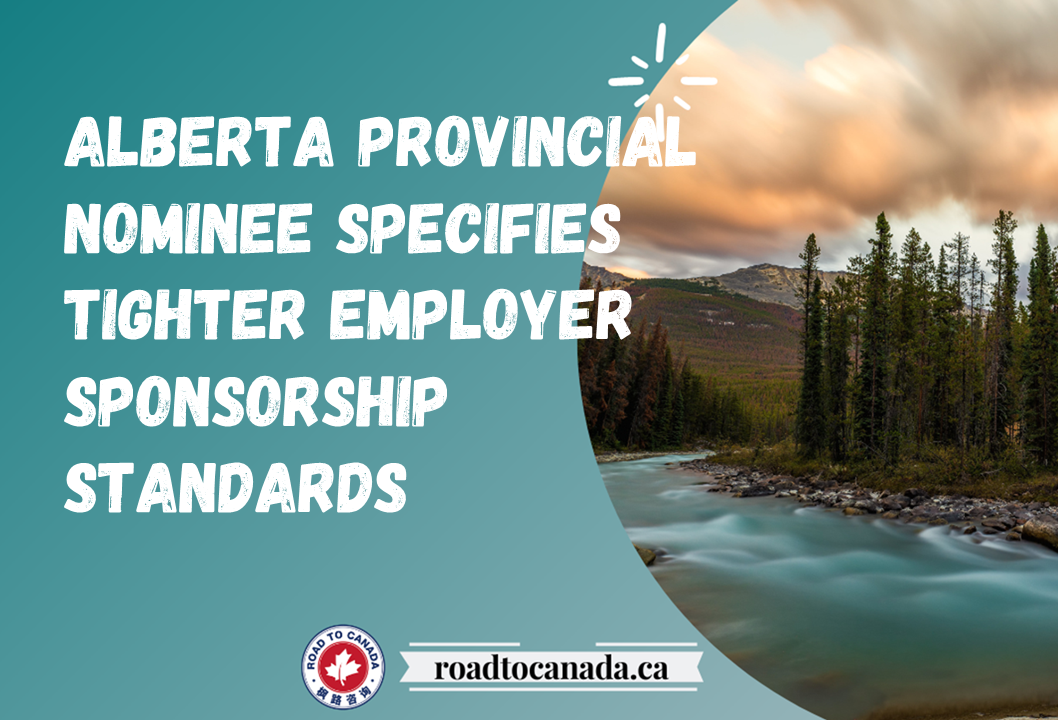
Alberta Provincial Nominee Specifies Tighter Employer Sponsorship Standards
On March 18, 2024, the official website of the Alberta Immigration Bureau quietly updated the requirements for employers of the Alberta Provincial Nominee (AAIP). It not only increased the company’s revenue, number of employees and operating years requirements, but also limited the company’s sponsorship Number of nominees.
In the past, the requirements for employers in the Alberta Provincial Nomination were relatively loose. They only required that the employer’s company be registered, operate legally in the province, and have a real office location. This has also led to many people who want to take shortcuts to take advantage of the loopholes.

Some handbag companies without any actual employees and even fictitious office locations also began to provide employer guarantees. After stricter employer restrictions were implemented, this crooked road was also blocked.
New provincial nomination employer requirements take effect for all provincial nomination applications.
New employer requirements
Employers offering jobs in Alberta to provincial nominee applicants must demonstrate to AAIP that:
- The enterprise operates legally;
- The business provides goods or services in Alberta;
- The applicant’s work is consistent with the company’s business activities or needs;
- Employers can fulfill all terms of the job offer, and these requirements must be verified by AAIP.
Alberta employers must:
- Be duly registered and have an established production capacity, factory or place of business in Alberta;
- Have been continuously and actively operating in Alberta for at least 2 full fiscal years (years for tax or accounting purposes) before submitting your application;
- Have an office location in Alberta where employees are expected to work regularly;
- Demonstrate need for this position by providing the following information:
- A valid work permit issued under a federal temporary foreign worker or international mobility program, or;
- The employer demonstrates that reasonable efforts have been made to attempt to fill the position with a Canadian citizen or permanent resident, as evidenced by recruitment results (when the nominated applicant does not live and work in Alberta, the federal Temporary Foreign Worker Program will be used recruitment and advertising requirements as broad guidance), or based on existing processes or pathway criteria.
- The business must have a total revenue of at least CAD$400,000 in the most recent fiscal year and employ at least 3 full-time (or equivalent) employees in Alberta;
- Independent contractors (self-employed) are not counted;
- Two part-time employees can be considered 1 full-time position as long as the total hours add up to at least an average of 30 hours per week.
Note: If the employer cannot prove annual gross income of $400,000 for the most recent tax year and has at least 3 full-time employees, the employer is still eligible to sponsor employees to apply for a provincial nomination, but depending on the number of years the employer has been operating in Alberta, they may The number of supported provincial nominee applicants will be limited to:
- Operating in Alberta for 2 years: 1 applicant can be nominated;
- Operating in Alberta for 3 years: 2 applicants can be nominated;
- One additional applicant can be supported for each additional year of operation.
First Nations, municipal, provincial and federal employers are not required to meet income and minimum employee requirements.
The cap on the number of nominees will come into effect on March 18, 2024. If the nominee leaves the employer, the nomination will continue to count toward job opportunity eligibility/employer operations.
Applicants must confirm with their employer that they can support their application. If the number of applicants supported by the employer exceeds their number of years of operation in Alberta, the application fee will not be refunded.
job offer requirements
- The applicant’s job offer or employment contract must be genuine, signed by a legitimate and verifiable Alberta employer, and must be:
- ongoing, paid employment;
- Full-time employment, i.e. at least 30 hours per week;
- Employed for 12 months or more;
- Wages and benefits that meet the provincial minimum wage, and:
- Meet or exceed the requirements set out in the Labor Market Impact Assessment (LMIA) (if applicable), or;
- Meet or exceed the minimum starting salary for the applicant’s occupation in all industries in Alberta;
- Non-wage compensation, including but not limited to compensation for company ownership, is not considered part of the applicant’s base monetary wage or salary;
- If the applicant’s job offer is LMIA exempt, the applicant’s salary and benefits must meet or exceed the minimum wage;
- Deductions are allowed for meals and lodging that meet employment standards. Proof of employee authorization for deductions is required;
The following people cannot apply for provincial nomination:
- part-time, temporary or seasonal employees;
- Independent contractors, business owners or temporary agency workers, including individuals listed on the Companies Registration System (CORES) as directors, shareholders or agents of an Alberta employer;
- Employees who work in Alberta in a location that is not zoned for commercial or industrial operations, such as a home-based business;
- Employees who do not work in Alberta, including remote workers.

This year, the provincial nomination has indeed made a lot of big moves. First, it closed the AOS, the Alberta Opportunity Category with the largest number of applicants, and then launched a new hotel and tourism talent category. Now it has added employer requirements, which is undoubtedly for many applicants. It was a slap in the face.
The conditions of at least two years of operating history, annual turnover of 400,000 Canadian dollars, and at least three full-time employees will exclude many small businesses. However, this regulation is originally intended to restrict companies that do not meet the requirements from arbitrarily sponsoring nominees. For large companies, , candidates working in medium-sized enterprises will not have any impact.
In terms of quotas, Alberta has continued to increase its provincial nominee program immigration quotas in the past few years. In 2023, Alberta’s provincial nomination quota will increase from 6,500 to 9,750, and is expected to further increase to more than 10,000 quotas in 2024. This growth reflects the province’s proactive approach to meeting its labor market needs and promoting economic development.
From another perspective, Alberta welcomes candidates working in key industries such as hospitality and tourism, health care, construction, agriculture, and technology. These people are more likely to be nominated by the province.



